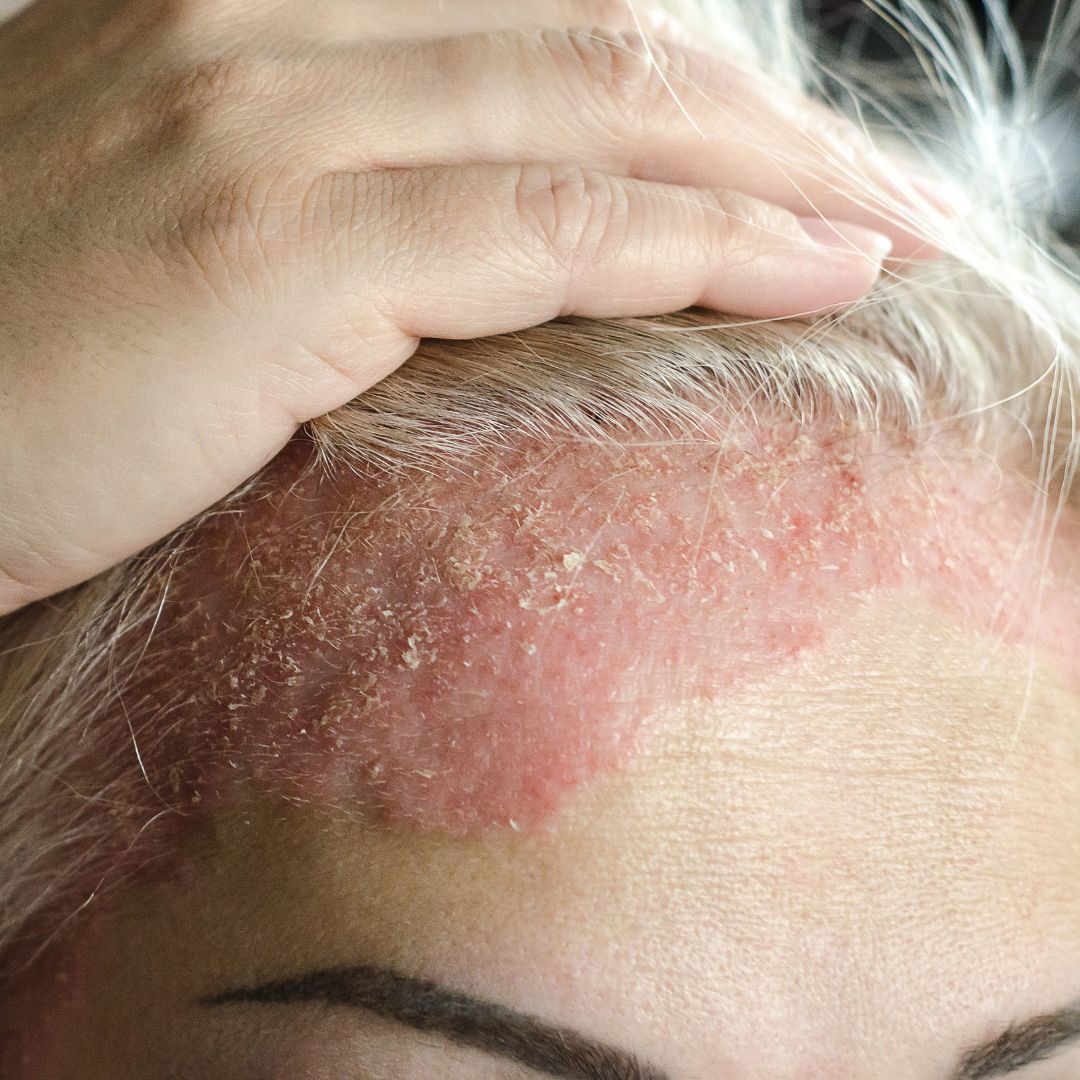Kiss Without Worry: 7 Ways to Keep Your Lips Healthy This Valentine’s Day
Stay kiss-ready this Valentine’s Day! Discover essential tips to prevent cold sores, manage stress, and protect your lips from harsh winter weather. Keep your lips smooth and healthy all season long.
Learn more6 Effective Ways to Treat Anxiety Naturally
Looking for natural ways to ease anxiety? Discover six effective remedies—from herbal supplements to mindfulness practices—that can help you find calm and balance without medication.
Learn more5 Fun Ways for Families to Reduce Stress During the Holiday Season
Discover 5 fun, family-friendly ways to reduce holiday stress! From dance parties to DIY ‘chill out’ jars, these activities help parents and kids relax, connect, and enjoy the season without the stress. Embrace the holiday cheer and unwind together!
Learn moreDaylight Savings and Your Health: Navigating the Clock Change
On Sunday, November 5, Daylight Saving Time (DST) for 2023 will conclude, and we will "fall back" by adjusting our clocks back one hour. DST was introduced in 1918 during World War I to extend daylight hours for energy conservation. Over 100 years later, we continue the tradition of changing our clocks twice a year.
Learn moreEmbracing Fall: How to Beat the End-of-Summer Blues with Positivity
And just like that, summer is gone, and fall has made its color-changing appearance. There’s no doubt that autumn brings beauty, but for some, the shorter days, busier schedules, less sunshine and cold breeze can also bring end-of-summer blues, too.
Learn moreYour Mental Health Matters: A Guide to Cultivating Emotional Wellness
Autumn has begun to roll in, and as the leaves start to change, it’s a good reminder for us to check in on our own mental health. Already the foliage is morphing into various colors, and as the leaves drop it allows us to reflect on the changes we need to make personally.
Learn moreEczema and Stress: The Connection and How Homeopathy Can Help
Most people don’t consider eczema as a severe ailment. However, it can still be a pain when it disrupts your daily life. One of the most frustrating parts of this chronic skin disease is the random flare-ups that happen with no obvious cause of what triggered them.
Learn moreManaging the Connection: Stress and Its Impact on Lower Back Pain
It’s no secret that high levels of stress can affect the body beyond the brain. And if not managed, it can contribute to physical issues, including lower back pain. So much so that the more a person deals with stress, their back pain can become exacerbated.
Learn moreScalp Psoriasis: Home Remedies and Tips for Relief
Scalp psoriasis is a chronic autoimmune skin condition that affects the scalp. It occurs when the immune system mistakenly attacks healthy skin cells, leading to an accelerated growth of skin cells. This excess build up is what results in thick, silvery-white scales and red patches on the skin and scalp.
Learn more5 Natural Ways to Relieve Migraine Pain
By Marina Medved-LentiniJune is National Migraine & Headache Awareness Month Natural migraine relief remedies are part of my migraine toolkit, in addition to medications. I rely on natural remedies during migraine attacks to abort them or decrease their severity. These tools may help when my medications aren’t working or when I can’t take any medications because I already took the allotted number for the week. As you may already know, taking acute medications too frequently may contribute to rebound headaches (medication overuse headaches) and worsen migraine disease. I find a multimodal approach the most effective when managing migraine. With preventative medications and treatments, lifestyle changes, and natural migraine relief treatments, I have been able to significantly reduce the number of monthly migraine days. I am always trying new treatments and products to try to help to relieve my migraine symptoms. Here are the five natural migraine relief remedies I currently use to manage migraine:1. Hot and cold therapy, which you can get from many different types of products, can help tremendously during a migraine attack. Heating pads that wrap around your neck and shoulders can help ease neck pain, a frequent migraine symptom for many. While cold packs, specifically those you can wear like a headband, are an excellent natural migraine relief strategy. While it depends on the person which therapy will work for them, it is worthy trying this simple and natural migraine relief remedy. 2. Migraine glasses are essential to anyone who experiences light sensitivity. I wear my light sensitivity lenses when using my phone, working on the computer, or watching TV. You’ll find me wearing them while I’m browsing the aisles of Target or waiting for my kids at their tennis or karate lessons.3. Earplugs are a great way to reduce noise for those with sound sensitivity. Whether your kids are being loud, your workplace is bustling, or you are somewhere crowded. You can still hear, but the earplugs help take the edge off of the noise.4. Stress management tools such as medication, yoga, gentle movement, and hobbies such as an adult coloring book are great ways to manage stress. More than 80% of people with migraine disorders report stress as a trigger. While yoga may not be what you use to reduce stress, finding what works for you is crucial in managing stress and migraine attacks.5. Forces of Nature organic plant medicine is also part of my migraine toolkit. The Migraine Pain Relief rollerball helps relieve migraine symptoms, including nausea. The Sleep Well rollerball helps promote deep, restful sleep. Consistent sleep is necessary for managing migraine attacks. The Calm Mood dropper helps relieve stress and reduce anxiety and worry. Forces of Nature creates safe, organic natural remedies for various ailments for everyone in your family. While there is currently no cure for migraine, there is hope. There are treatments that can help you manage your migraine disease by significantly reducing the frequency or severity of your symptoms. It is vital to try different treatments and work on reducing as many triggers as possible. I have plenty of bad days, but I am so grateful for all the good days and sometimes weeks. I will continue to hold on to hope and strive to find what works best for me when managing migraine. I hope you do too.Bio:Marina Medved-Lentini is the founder of Parenting With Migraine, dedicated to helping people with migraine, especially parents, live a more empowered life by offering education, support, and hope. She lives in Massachusetts with her husband and two children. When she is not working or being a migraine advocate, she enjoys gardening, listening to audiobooks, and spending time with her family.
Learn moreHomeopathic Remedies for Stress: 9 Options to Consider
By Dr. Peter Klapper Ph.D. Stress is unavoidable. You've probably experienced it at one time or another. However, that isn't to say that you should accept stress when it happens. Stress can significantly affect your overall health. It can trigger headaches, muscle tension, anxiety, and restlessness. When left unmanaged, it can lead to chronic diseases and behavioral disorders. If you feel stressed frequently, it's worth looking at different methods to stay calm. One of these methods is homeopathy, an alternative medical system that relies on the body to cure itself using natural substances. You can use homeopathy as a holistic approach to stress or anxiety management.This blog will guide you in choosing the best homeopathic remedies and other natural stress management methods and learning about the many benefits of homeopathy.Homeopathic Remedies for StressStress can lead to drastic and irreversible consequences when unmanaged. As such, it's important to treat it as early as possible. Below are some homeopathic remedies for stress.1. Allium sativum Common name: GarlicSince ancient times, people have used allium sativum or garlic to treat hypertension, high blood pressure, infections, tense muscles, snakebites, and blood clots. Homeopathic doctors also recommend this remedy for stress because of its analgesic, anti-inflammatory, and antioxidant properties, among other benefits.2. Avena sativa Common name: OatEvery part of the avena sativa plant offers many health benefits. For instance, its beta-glucan fiber content helps reduce fatigue, headaches, and other anxiety symptoms. Its oat extracts can also improve memory, attention, and mood. Generally, avena sativa can treat stress, headaches, and nervous exhaustion. 3. Angelica Common name: Angelica Homeopathic doctors recommend angelica for relieving nervousness and tension associated with stress and anxiety. It's also a traditional remedy for insomnia, heartburn, appetite loss, arthritis, and circulation problems. When applied topically, angelica can treat nerve and joint pain and skin disorders.4. Coffea cruda Common name: Green coffeeCoffea cruda is from unroasted green coffee beans. Since coffee naturally boosts energy levels and triggers nervousness, its use in homeopathy includes treating stress-related symptoms like overstimulation or mental hyperactivity. That is based on the principle of "like cures like." Past studies have also shown that coffea cruda helps relieve headaches with sleeplessness and sensitivity to noise, light, and contact.5. Ocimum Common name: Holy basilIndia's ancient medical system Ayurveda considers ocimum sanctum an anti stress remedy. It's famous for treating mental and nervous disorders, decreasing adrenaline, and increasing serotonin levels in the brain. Researchers have also found that another variant of ocimum called ocimum tenuiflorum, commonly known as tulsi or holy basil, can address physical, chemical, metabolic, and psychological stress. It can normalize blood pressure, glucose, and lipid levels while improving memory and the brain's cognitive function.6. Passiflora incarnata Common name: Wild maracujaAlso called wild maracuja, bush passion fruit, or wild water lemon, passiflora incarnata is a plant commonly used in traditional Brazilian medicine as a mild sedative and antidepressant. Past studies have also shown that this remedy can reduce stress, improve motor activity, and manage sleep disorders, memory loss, and degenerative brain diseases.7. Scutellaria lateriflora Common name: Blue skullcapScutellaria lateriflora is popular in North America for treating anxiety, nervous tension, convulsions, and headaches. Homeopaths use its leaves to produce antioxidant effects and protect against Alzheimer's disease, Parkinson's disease, anxiety, and depression, among other neurological disorders. Its Chinese variant, scutellaria baicalensis, can also treat headaches, inflammation, and allergies. Studies say it can also reduce symptoms of diabetes and hypertension.8. Verbena Common name: VerbenaThe verbena plant has long been used for sore throats, respiratory tract diseases like asthma and cough, and heart conditions like chest pain. In stress management, it treats exhaustion, nervous disorders, and spasms. It's also instrumental in reducing symptoms of menopause and irregular menstruation.9. Piper methysticum Common name: KavaPiper methysticum or kava is a shrub of large leaves that grows in the South Pacific Islands, traditionally used as an anxiolytic and sedative. It calms agitated people from mental overactivity and generally treats anxiety and stress. Its psychomotor effects are the reason it was one of the first herbal medications in anesthetics.Other Natural Treatments for StressAside from the homeopathic remedies above, you can manage stress in many other natural ways. Below are some tips you can try.ExerciseActively moving your body can boost its production of feel-good neurotransmitters called endorphins, protect you from the harmful effects of stress, and improve your mood. The good thing is that you're not limited to one form of exercise. You can go on a simple walk or jog, do sports, or follow different workout routines.Consult your homeopathic doctor to know which exercise routine can help you manage stress. Ensure you also do what you love for you to have a pleasant time.Meditation and relaxation exercisesIf you don't want to exercise, consider meditating instead to focus your attention, compose your thoughts, and remove yourself from stressful situations. You can do breathing exercises, repeat mantras, pray, or read a book. Whatever meditation method you use should help you relax and regulate your emotions.Sufficient sleepAdults with fewer than eight hours of sleep a night experience higher stress levels than those who get at least eight hours of shuteye. Lack of sleep also causes people to feel sluggish or lazy (53%), irritable (38%), and unmotivated to fulfill responsibilities (25%). That said, ensure you sleep enough to feel productive and refreshed daily.Herbal teasHerbal tea flavors such as lavender and chamomile contain anti-inflammatory, antioxidant, antiviral, and antibacterial compounds that can reduce stress levels and lengthen your life span. Drink no more than three to four cups of tea daily to enjoy its benefits and avoid side effects such as reduced iron absorption, increased stress, nausea, and heartburn.AromatherapyAncient civilizations used aromatherapy to treat their minds and bodies holistically. It involves inhaling essential oils to relax, fall asleep, improve mood, and reduce heart rate and blood pressure. Some of the best essential oils for stress relief are clary sage, ylang-ylang, lavender, chamomile, and sandalwood.Live Stress-Free with HomeopathyEverybody responds to stress in different ways. Some people binge-eat, smoke or drink alcohol, or simply shut their bodies down. Fortunately, you can turn to natural methods like homeopathy for stress management.If you're ready to treat your stress levels naturally, look no further than Forces of Nature for effective homeopathic remedies. Our products are registered with the FDA to ensure you get the best treatments for various conditions. Browse our catalog of homeopathic remedies for stress today!
Learn moreChildhood Stress: 4 Signs Parents Should Be Aware Of
By Dr. Peter Klapper Ph.D. Contrary to popular belief, adults aren't the only ones suffering from stress—children are, too. The Annie E. Casey Foundation reports that 11.8% of American children experience anxiety or depression. Fortunately, there are things you can do as a parent to help your kids cope with stress. It's crucial to address these issues before they worsen, as failing to do may result in chronic mental, emotional, and physical conditions. Conversely, helping kids cope with challenges is vital to secure their well-being and facilitate emotional and cognitive development amid extreme life events. In this article, we'll delve deeper into childhood stress—its causes and signs and some approaches to help alleviate your kid's stress and anxiety. What is Childhood Stress?Childhood stress is a result of anxieties and pressures that young people experience in daily life. They often occur due to powerful events, like sports or academic and social expectations.Stress is a natural part of life, and you should not attempt to isolate your child from stress fully. Not every stressful event is terrible since they help kids build resilience and character.However, problems arise when children can't handle intense emotions. Their failure to cope can harm their mental health, so you must identify their stressors and help them navigate their feelings effectively to avoid their stress from affecting their health and well-being.Causes of Childhood StressThe first step to treating the effects of childhood stress is to identify its triggers. As mentioned, drastic life changes impact a kid's mind, regardless if it's a positive or negative event, so you need to be aware of what may cause their anxieties. Some common causes of stress in childhood include: academic pressure; family conflicts; bullying; trauma; and health issues. 4 Signs of Childhood StressStress manifests in different ways, but their common denominator is they emotionally, mentally, and physically change children and how they interact with their environment. Look out for these signs of childhood stress.Behavioral changesThose who undergo stress in childhood may show changes in their behavior. Children may suddenly become reserved and standoffish, leading to emotional outbursts inconsistent with their usual behavior. These behavioral changes include irritability, aggression, and withdrawal.Emotional changesStress also impacts how kids handle their emotions, making them more emotional than usual and exhibiting compulsive behavior. As such, stress can trigger notable conditions: anxiety, depression, or mood swings.Physical symptomsStress also manifests as physical symptoms that could exacerbate children's anxieties. Sleeplessness and poor appetite may weaken their bodies, leading to more severe illnesses. It's essential to keep tabs on their physical well-being, which might be at risk if they show the following symptoms: headaches; stomachaches; Cognitive changesWhile children are usually hyperactive and have poor attention spans, sudden cognitive changes may indicate stress. For example, performing in school becomes significantly challenging, leading to bad grades and further pressure. Other indications include: poor concentration; forgetfulness; How to Help Kids with Stress ManagementTeaching kids how to cope with changes is essential to becoming well-rounded individuals. In effect, they won't suffer from illnesses or drastic behavioral, emotional, and cognitive changes due to unmanaged stress.Foster a supportive relationshipKids undergoing sudden life changes without emotional support from trusted adults may feel alone. So, listen and talk about their grievances to let them know their feelings are valid and safe and that you will support them through the most challenging times.Teach and model positive coping skillsIt's also important to introduce healthy coping mechanisms to help the child deal with stress by themselves. You could practice emotion labeling, positive self-talk, and breathing exercises. Then, teach them how to communicate their feelings effectively, be patient, and take measures to address and minimize their stressors. The goal is for them to handle their feelings even if help is not around.Create a stress-free home environmentFostering a stress-free household is essential. After all, the home should be where your kids can have a break from worries. A frantic, unorganized environment can trigger or exacerbate stress. As parents, take the time to participate in their favorite activities to foster positive emotions at home and offset pressures.Encourage physical activity, healthy eating, and restful sleepHelp your child deal with worries by adopting a healthy lifestyle. Exercise is an excellent start to reduce stress and treat anxiety and depression. Then, ensure they eat nutritious meals and get eight hours of sleep every night. Forces of Nature's Sleep Well for Kids can help them rest and wake up refreshed if they have trouble falling asleep.Consider counseling and therapySometimes, lifestyle changes aren't enough to relieve stress, especially after traumatizing events. If your advice doesn't ease their worries, it may be time to contact mental health professionals. Therapists can intervene and help young family members practice positive mental health habits that can last well into adulthood.Manage symptoms with homeopathic treatmentsSevere cases of stress need medical intervention. However, anti-anxiety meds usually have various side effects, like dizziness, fatigue, headaches, and nausea, which may worsen your child's condition.Fortunately, natural treatments ease stress without side effects. For example, Calm Mood for Kids reduces mood swings and relaxes them. Consider talking to a homeopathic doctor about stress-relieving remedies to alleviate children’s anxieties.Keep Your Child Calm with HomeopathyStress becomes inevitable as your child grows, so it's crucial to help them understand how to deal with their feelings. Watch out for signs of behavioral, physical, mental, and emotional changes, then determine the right approach to help them cope. In turn, they can become emotionally intelligent adults who can take on whatever may come their way.Luckily, you don't have to do it alone. Forces of Nature's all-natural, USDA Certified Organic homeopathic medicine can help children cope with stress safely to grow into well-rounded adults. Visit our shop today!
Learn more












